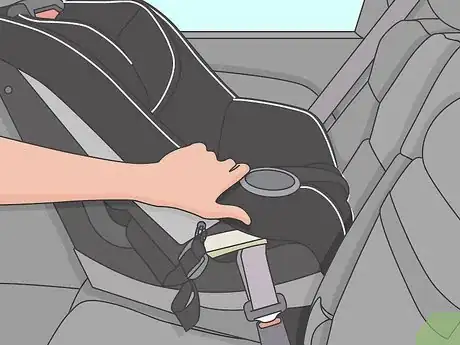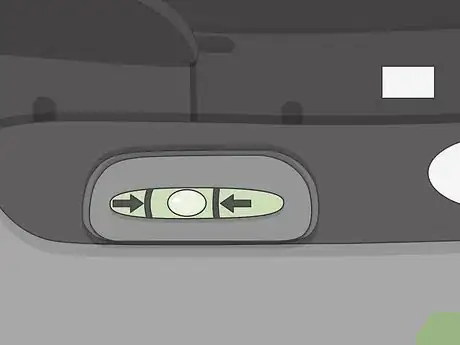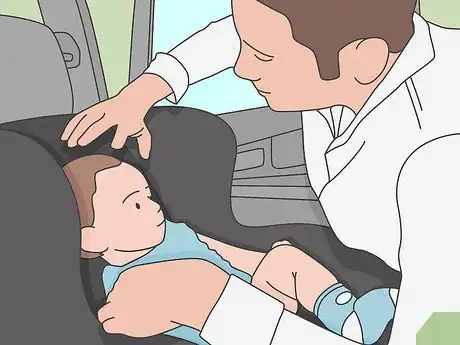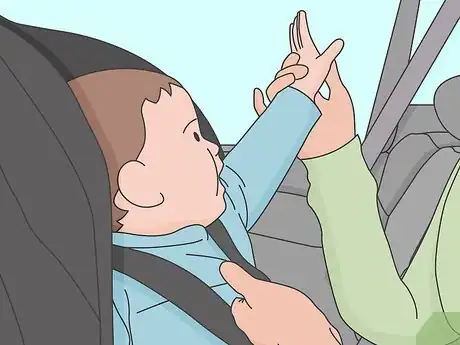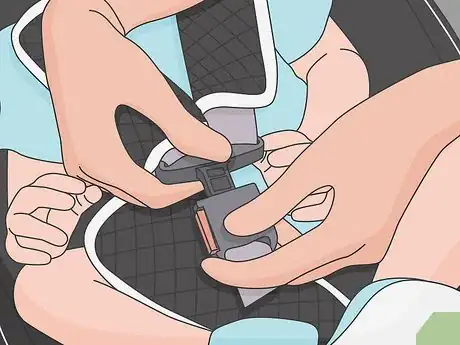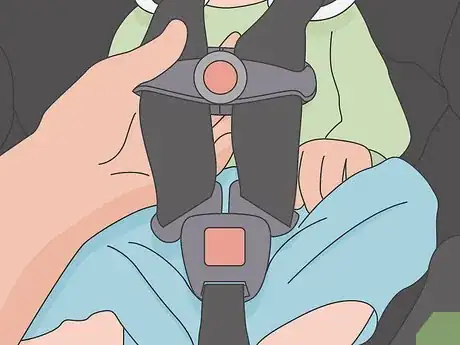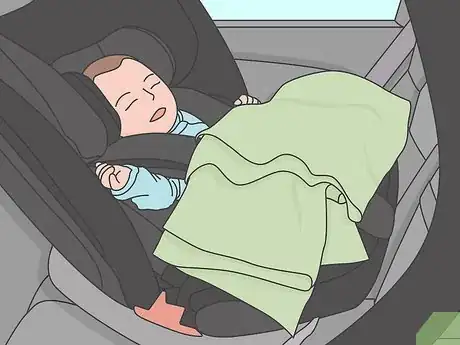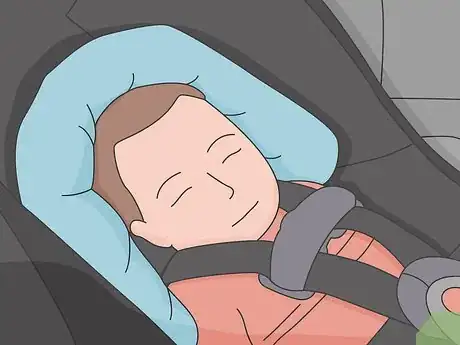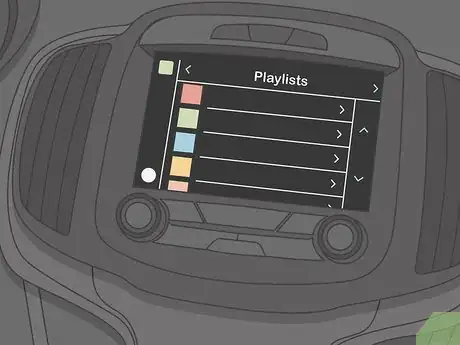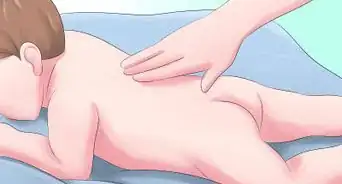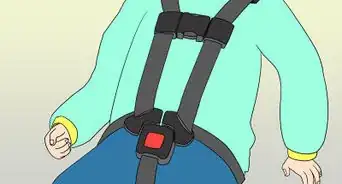This article was co-authored by Jami Yaeger. Jami Yaeger is a Parenting Specialist, Doula, and the Owner of AustinBorn, an online community offering comprehensive and modern education to growing families. With 10 years of experience, Jami specializes in whole family support for pregnancy, birth, postpartum, and parenting. Jami earned her BA in Theatre Performance from San Diego State University and earned her Certification as a Lactation Education Counselor from the University of California, San Diego. She is a Certified Infant and Child CPR Instructor, Birth and Postpartum Doula, and Childbirth Educator.
This article has been viewed 13,399 times.
Securing a newborn in a car seat can be intimidating, especially if you’ve never done it before. It’s important to get the proper seat positioning and level of snugness in the straps to keep your newborn safe. Luckily, doing this is a lot easier than it might seem. Take a deep breath, take your time, and double-check everything.
Steps
Securing Your Newborn in the Seat
-
1Install a rear-facing car seat base in the back seat of your vehicle. Follow the manufacturer’s instructions for how to properly install the car seat. This will vary depending on the type of car seat you have. However, make sure that the car seat is positioned so that your newborn will be facing towards the rear of your vehicle and place the base in the back seat, never in the front.[1] [2]
- If you can safely secure the car seat into the center of the backseat of your vehicle, this is the safest place for it.
Tip: In some communities, you can visit your local fire department during certain hours and ask them to check to see if your car seat base is properly installed. You could also ask a nurse to help you secure your newborn into their car seat for the first time if you’re getting ready to leave the hospital after having a baby.
-
2Position the seat so that it’s semi-reclined. Check the side of the car seat for 2 parallel lines. These indicate the correct angle to position the seat. Adjust the seat until it is at the correct angle. If the seat’s base is properly installed, the car seat should be correctly aligned when you click it into the base. If not, the base may not be level.[3]
- Some car seats have a color indicator that will appear green or blue is the car seat is correctly aligned and red or yellow if it’s not. Consult your car seat manual for details on how to interpret this type of indicator.
Advertisement -
3Place your newborn into the car seat. Unbuckle and move the straps to the side to make it easier to put your baby into their seat. Hold your newborn with one hand under their bottom and the other hand supporting their head and neck. Then, gently place your baby into the car seat so that they’re centered between the straps.[4]
-
4Insert your newborn’s arms through the shoulder straps. Gently grasp 1 arm and guide it through the strap on that side of your newborn’s body. Then, repeat on the other side. Make sure that the straps are not twisted.[5]
- Check to ensure that the shoulder straps are at or below the level of your baby’s shoulders after you have positioned them in the car seat. If not, take your newborn out of the car seat and adjust the straps.
-
5Fasten the buckles across your newborn’s chest and between their legs. Slide the chest buckle up so that it is going across the center of your newborn’s chest, not over their belly or neck. Then, click the ends together to secure the buckle. Find the ends that connect to the buckle between your newborn’s legs next and slide them over as needed to attach them. Then, click them into place.[6]
- Make sure that the straps are not twisted and the buckles are facing forward before you connect them.
-
6Adjust the straps so they’re snug, but you can fit 2 fingers under them. This is a good general rule for testing the fit of your baby’s car seat straps. If the straps are too tight to fit 2 fingers under, they’re too tight. If the straps are loose enough to fit more than 2 fingers under, they’re too loose.[7]
- Your newborn may feel more secure if the straps are snug since it will remind them of being held and swaddled.
Making Baby Comfortable in the Seat
-
1Cover your baby with a blanket after they’re in the car seat if it's cold. Don’t put your baby into their car seat with a coat on or a blanket wrapped around them. Put them into the car seat and then drape a blanket over your baby’s body from the shoulders down. Tuck the blanket in along the sides of your baby’s body to secure it.[8]
- You can also drape your baby’s coat over their lap if you don’t have a blanket.
-
2Position a tightly rolled blanket around your baby’s head to support it. Lay a baby blanket on a flat surface and fold over about 2 in (5.1 cm). Then, begin rolling the blanket towards its center. Keep rolling until the blanket is in a tight roll. Place the rolled up blanket over the top of your baby’s head and tuck the ends in under their shoulders.[9]
- Many car seats include a head rest piece that helps to keep your newborn’s head in place. However, if your car seat doesn’t have one of these, you can improvise with a baby blanket.
-
3Play some soothing music or talk to your baby while you drive. A newborn may become agitated after being placed in a car seat and it can be hard to do much about that if you’re the one driving the car. Try playing some soothing music over the radio, such as classical music or a lullaby. You could also talk or sing to your baby to reassure them while you drive.[10]
- Make sure to keep your eyes on the road even if your baby is crying. It can be hard to hear your baby cry, but remember that if your baby is properly secured in their car seat, they’re okay.
Warning: Toys attached to a car seat handle can be entertaining for your newborn, but they may also pose a serious hazard if you get into a car accident. Remove any toys from the car seat’s handle before you start driving with your newborn in their car seat.[11]
Expert Q&A
-
QuestionHow do I know if the shoulder straps are tight enough?
 Jami YaegerJami Yaeger is a Parenting Specialist, Doula, and the Owner of AustinBorn, an online community offering comprehensive and modern education to growing families. With 10 years of experience, Jami specializes in whole family support for pregnancy, birth, postpartum, and parenting. Jami earned her BA in Theatre Performance from San Diego State University and earned her Certification as a Lactation Education Counselor from the University of California, San Diego. She is a Certified Infant and Child CPR Instructor, Birth and Postpartum Doula, and Childbirth Educator.
Jami YaegerJami Yaeger is a Parenting Specialist, Doula, and the Owner of AustinBorn, an online community offering comprehensive and modern education to growing families. With 10 years of experience, Jami specializes in whole family support for pregnancy, birth, postpartum, and parenting. Jami earned her BA in Theatre Performance from San Diego State University and earned her Certification as a Lactation Education Counselor from the University of California, San Diego. She is a Certified Infant and Child CPR Instructor, Birth and Postpartum Doula, and Childbirth Educator.
Parenting Specialist Ensure the shoulder straps are snug by doing the pinch test. The pinch test is conducted by trying to pinch the top of the strap fabric that lays over the shoulders. If you’re able to pinch the fabric, then the strap is too loose.
Ensure the shoulder straps are snug by doing the pinch test. The pinch test is conducted by trying to pinch the top of the strap fabric that lays over the shoulders. If you’re able to pinch the fabric, then the strap is too loose. -
QuestionShould the car seat be able to move around at all?
 Jami YaegerJami Yaeger is a Parenting Specialist, Doula, and the Owner of AustinBorn, an online community offering comprehensive and modern education to growing families. With 10 years of experience, Jami specializes in whole family support for pregnancy, birth, postpartum, and parenting. Jami earned her BA in Theatre Performance from San Diego State University and earned her Certification as a Lactation Education Counselor from the University of California, San Diego. She is a Certified Infant and Child CPR Instructor, Birth and Postpartum Doula, and Childbirth Educator.
Jami YaegerJami Yaeger is a Parenting Specialist, Doula, and the Owner of AustinBorn, an online community offering comprehensive and modern education to growing families. With 10 years of experience, Jami specializes in whole family support for pregnancy, birth, postpartum, and parenting. Jami earned her BA in Theatre Performance from San Diego State University and earned her Certification as a Lactation Education Counselor from the University of California, San Diego. She is a Certified Infant and Child CPR Instructor, Birth and Postpartum Doula, and Childbirth Educator.
Parenting Specialist Ensure the car seat does not move 1 inch in any direction. Use either the seat belt or the LATCH system to secure the seat—not both.
Ensure the car seat does not move 1 inch in any direction. Use either the seat belt or the LATCH system to secure the seat—not both. -
QuestionWhat are some things I should avoid when setting up my newborn's car seat?
 Jami YaegerJami Yaeger is a Parenting Specialist, Doula, and the Owner of AustinBorn, an online community offering comprehensive and modern education to growing families. With 10 years of experience, Jami specializes in whole family support for pregnancy, birth, postpartum, and parenting. Jami earned her BA in Theatre Performance from San Diego State University and earned her Certification as a Lactation Education Counselor from the University of California, San Diego. She is a Certified Infant and Child CPR Instructor, Birth and Postpartum Doula, and Childbirth Educator.
Jami YaegerJami Yaeger is a Parenting Specialist, Doula, and the Owner of AustinBorn, an online community offering comprehensive and modern education to growing families. With 10 years of experience, Jami specializes in whole family support for pregnancy, birth, postpartum, and parenting. Jami earned her BA in Theatre Performance from San Diego State University and earned her Certification as a Lactation Education Counselor from the University of California, San Diego. She is a Certified Infant and Child CPR Instructor, Birth and Postpartum Doula, and Childbirth Educator.
Parenting Specialist Don’t purchase a used car seat unless you know the history. Look for the manufacturer's information listed on the seat so you can check for expiration dates and any recall before using. Also, don’t use a car seat that has been in an accident, and don’t use accessories on the car seat that do not come directly from the manufacturer. This could cause further injury and void the product warranty. Don’t put your newborn in the car seat while they’re wearing bulky coats or clothing. This could prevent the straps from safely securing your baby in the seat. Finally, never leave your child in the car alone. Always check state laws to determine at what age a child can be left in the car without an adult.
Don’t purchase a used car seat unless you know the history. Look for the manufacturer's information listed on the seat so you can check for expiration dates and any recall before using. Also, don’t use a car seat that has been in an accident, and don’t use accessories on the car seat that do not come directly from the manufacturer. This could cause further injury and void the product warranty. Don’t put your newborn in the car seat while they’re wearing bulky coats or clothing. This could prevent the straps from safely securing your baby in the seat. Finally, never leave your child in the car alone. Always check state laws to determine at what age a child can be left in the car without an adult.
References
- ↑ https://www.chop.edu/centers-programs/car-seat-safety-kids/car-seat-safety-by-age/newborn-2-years
- ↑ Jami Yaeger. Parenting Specialist. Expert Interview. 29 April 2021.
- ↑ https://www.mayoclinic.org/healthy-lifestyle/infant-and-toddler-health/in-depth/car-seat-safety/art-20043939
- ↑ https://www.mayoclinic.org/healthy-lifestyle/infant-and-toddler-health/in-depth/car-seat-safety/art-20043939
- ↑ https://www.chop.edu/centers-programs/car-seat-safety-kids/car-seat-safety-by-age/newborn-2-years
- ↑ https://www.mayoclinic.org/healthy-lifestyle/infant-and-toddler-health/in-depth/car-seat-safety/art-20043939
- ↑ https://www.mayoclinic.org/healthy-lifestyle/infant-and-toddler-health/in-depth/car-seat-safety/art-20043939
- ↑ https://www.chop.edu/centers-programs/car-seat-safety-kids/car-seat-safety-by-age/newborn-2-years
- ↑ https://www.mayoclinic.org/healthy-lifestyle/infant-and-toddler-health/in-depth/car-seat-safety/art-20043939
